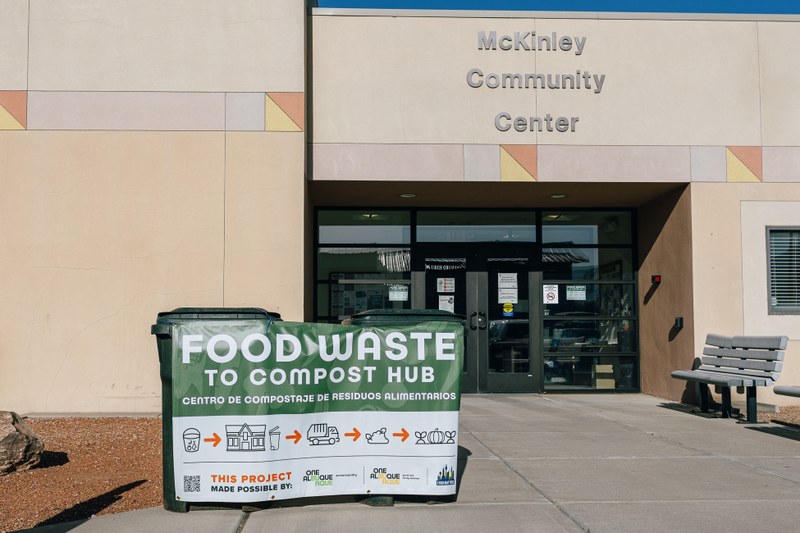
From Food Waste to Fertile Soil: City's Food Waste to Compost Hub Pilot
Project composts residential food waste, redirecting from landfills and replenishing Albuquerque soil.
This week, the City is starting a project to collect residential food waste at McKinley Community Center that will then be composted. Up to 60 households who are members of the community center, Palo Duro 50+ Sports and Fitness Center, or have students enrolled in the nearby elementary or middle school will be able to participate and receive a starter toolkit that will help them divert food waste from the landfill.
Coordinated by the Sustainability Office and hosted by the Department of Youth & Family Services, local hauler Little Green Bucket will transport the compostable material to a commercial compost facility, where it will be turned into finished compost.
“Albuquerque is charting the course toward a more climate-resilient future,” said Mayor Tim Keller. “We are committed to achieving a broad range of sustainability goals, and what better than to bring together neighborhoods and families to compost, conserve, and become more mindful of food waste.”
“We heard from the community last year a desire for a low-cost and easily accessible way to compost. This method of aggregating food scraps from kitchens to community collection is a great start,” said City of Albuquerque Sustainability Officer Ann Simon.
“Together, the City and participating households are utilizing nature’s process of recycling nutrients in kitchen scraps to reduce greenhouse gas emissions, work toward pollution reduction goals, and build healthy local soils,” said Environmental Health Department Sustainable Waste Specialist Sandra West.
About a third of the food supply in the United States ends up going to waste, and the Natural Resources Defense Council estimates that 112,000 tons of food is wasted in Albuquerque each year. Diverting those items from the landfill and turning them into compost avoids methane gas emissions, and instead creates a rich compost that supports soils and plants.
With an estimated 290 pounds of food wasted per capita each year, the pilot has the capacity to divert tons of material from the landfill in a single year, while also avoiding greenhouse gas emissions and building healthy soils in the Albuquerque area.
“Teaching waste prevention and composting will have a positive impact on the youth and families of the McKinley community,” said Youth & Family Services Director Katarina Sandoval. “This community center will serve as a great hub to connect everyone in their sustainability efforts!”
“As a local, community-centered food scrap collection business, we are happy to support the City’s work to direct compostable materials to feeding soils instead of landfills,” said Founder of Little Green Bucket Brad Weikel.
The pilot supports goals in the City’s 2021 Climate Action Plan and was designed based on extensive community outreach. More than 200 people provided valuable feedback about their vision for an equity-focused community-scale composting program, which was vital for making this pilot possible.
Starting during Food Waste Prevention Week, the pilot lays the foundation for scalable food waste diversion for residents utilizing City facilities. It also works in concert with the community on waste reduction across the food chain, and helps households prevent food and save money in addition to diverting food waste for composting. Lessons learned during the pilot will inform future sustainable waste work at the City.
